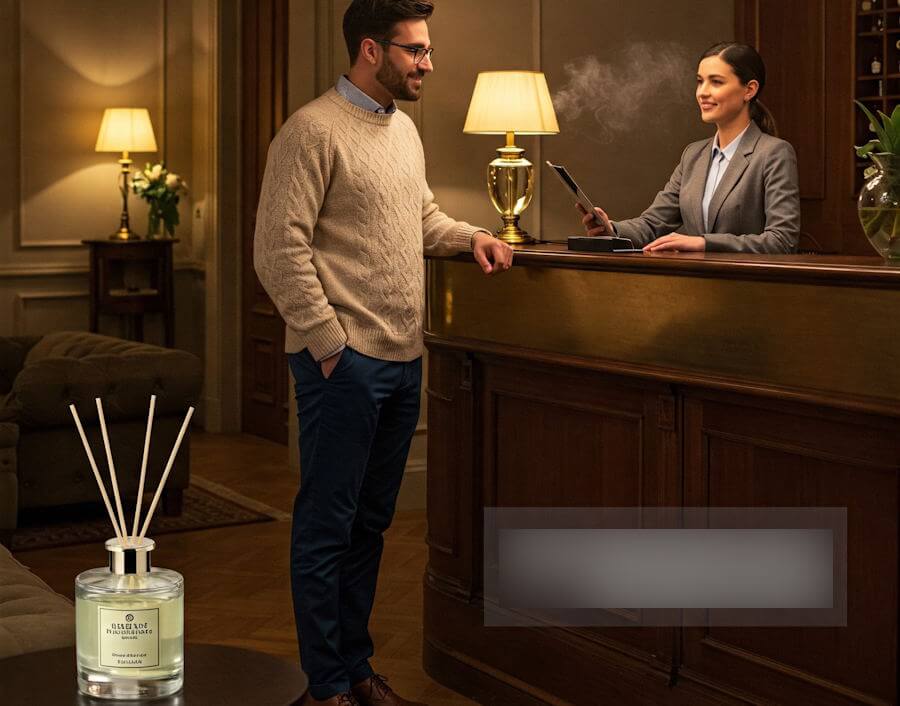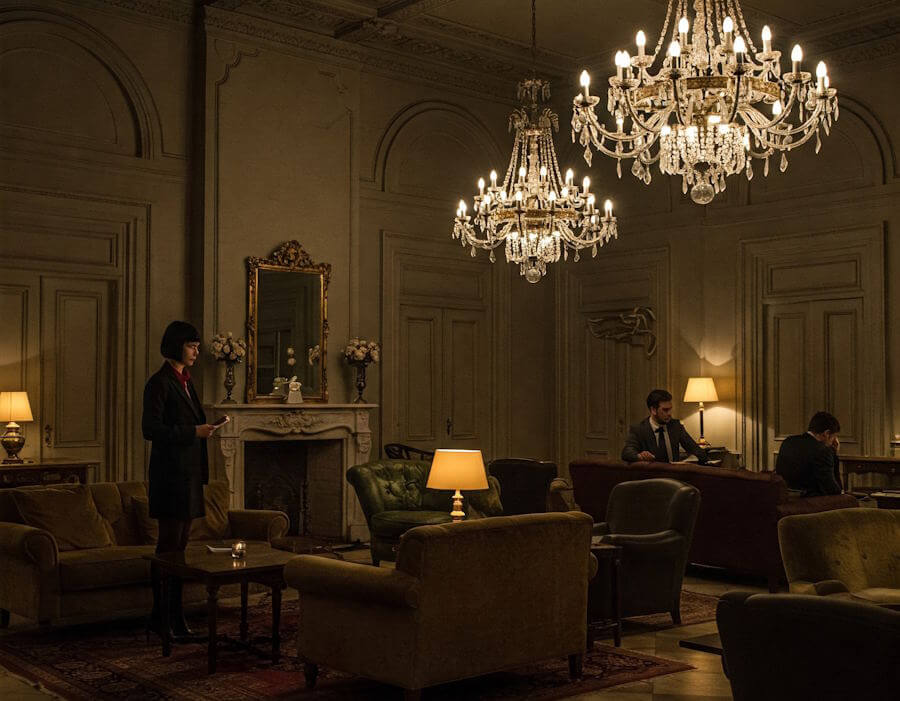Scent branding is an innovative marketing strategy that involves using specific fragrances to create a distinctive identity for a brand or establishment. Particularly in the hospitality industry, and more specifically within boutique hotels, scent branding plays a pivotal role in enhancing guest experiences. The concept revolves around the idea that our sense of smell is intricately linked to memory and emotions. By strategically incorporating unique scents, boutique hotels can evoke positive feelings and create lasting impressions, thus differentiating themselves in a competitive market.
In the hospitality sector, the emphasis on creating a memorable environment has become increasingly important. Scent branding serves as a tool to engage the senses of guests, fostering an atmosphere that aligns with the hotel’s brand personality. For boutique hotels, which often emphasize individuality and uniqueness, the chosen fragrances can represent the essence of the establishment, resonating with the target audience’s preferences. As guests enter a hotel and are enveloped in a carefully curated scent, it contributes to the overall ambiance while also enhancing the emotional connection to the space.
The significance of scent in shaping customer experiences cannot be understated. Studies have shown that pleasant fragrances can lead to increased time spent within an establishment, enhancing customer satisfaction and encouraging repeat visits. For boutique hotels, which rely heavily on guest loyalty and word-of-mouth referrals, implementing effective scent branding strategies can be a game changer. By curating scents that align with their brand narrative, boutique hotels can create a cohesive sensory experience that not only welcomes guests but also ensures they leave with fond memories associated with the specific aromas encountered during their stay.
The Importance of a Unique Guest Experience
In the competitive hospitality market, particularly within boutique hotels, the emphasis on providing a unique guest experience is paramount. Unlike larger hotel chains that often rely on standardized branding procedures, boutique hotels have the flexibility to carve out distinctive identities. This differentiation is critical in attracting discerning travelers who are seeking more than just a place to stay; they desire an immersive experience that resonates with their personal tastes and preferences.
Scent branding has emerged as a powerful tool in achieving this uniqueness. The psychological impact of scent on human emotions and memory is well-documented, making it a strategic element in the overall guest experience. Scents possess the ability to evoke strong feelings of nostalgia, comfort, or even adventure, which can significantly enhance a guest’s stay. For instance, a boutique hotel may choose to incorporate a signature scent in its lobby or guest rooms, allowing the smell to become synonymous with the brand. This olfactory signature not only enriches the environment but also helps guests forge memorable associations with their visit.
The relationship between scent and memory is particularly beneficial in creating a lasting impression. Research indicates that fragrances can activate parts of the brain associated with memories, making it easier for guests to recall their experiences long after they have departed. This psychological connection enhances brand loyalty, leading to repeat visits and positive word-of-mouth recommendations. As such, integrating scent branding into the boutique hotel experience is not merely a matter of luxury; it has tangible benefits in terms of guest satisfaction and retention.
In conclusion, the significance of providing a unique guest experience cannot be understated. Scent branding serves as a vital component in distinguishing boutique hotels from their larger counterparts, offering an avenue for fostering emotional connections and enhancing overall satisfaction. By thoughtfully incorporating this sensory element, boutique hotels can create memorable experiences that resonate with guests on a profound level.
How Scent Influences Consumer Behavior
The impact of scent on consumer behavior has garnered significant attention from both researchers and marketers, particularly as it pertains to the hospitality industry. Scientific studies have established a clear link between olfactory stimuli and various aspects of consumer experience, suggesting that scents can profoundly influence spending patterns, length of stay, and overall satisfaction in boutique hotels.
One notable finding in this realm is that pleasant scents can enhance a guest’s overall perception of the environment, leading to increased satisfaction. For instance, research indicates that visitors exposed to a pleasant fragrance are likely to have a more favorable impression of the hotel, which can translate into longer stays. The emotional responses invoked by specific scents can create a memorable atmosphere, encouraging guests to prolong their visit and even return in the future.
Moreover, various studies highlight that scent can directly affect consumer spending habits. Hotels that utilize fragrance strategically have reported an increase in guests’ willingness to spend more on services and amenities. For example, the presence of a luxurious scent in a spa can encourage patrons to indulge in additional treatments, thereby boosting revenue. This correlation between scent and spending is rooted in the powerful connection between olfactory experiences and emotional states, which can significantly enhance a guest’s willingness to part with their money.
Additionally, scent can evoke nostalgic responses or create feelings of relaxation and comfort, two essential elements in the hospitality experience. When a boutique hotel employs a signature scent, it not only differentiates itself from competitors but also deepens the emotional engagement with its clientele. In essence, the integration of scent into a hotel’s branding strategy can yield a distinct and influential impact on consumer behavior, leading to enhanced satisfaction and increased revenue.
Developing a Signature Scent
Creating a signature scent for a boutique hotel involves a careful and thoughtful process that merges creativity with strategic branding. The first step typically involves collaboration with professional scent designers, who possess the expertise needed to translate the hotel’s unique identity into olfactory experiences. These scent designers utilize their skills to craft a fragrance that encapsulates the essence of the hotel’s atmosphere, culture, and aesthetic.
A vital component of this process is scent profiling. This entails an in-depth analysis of the hotel’s brand characteristics, guests’ expectations, and the overall ambiance that the hotel aims to convey. Through interviews, surveys, or workshops, hotel management can gather insights regarding potential scents that resonate with their target audience while reflecting the hotel’s personality. Factors such as location, architectural style, and intended guest experience are all pivotal in shaping the direction of the scent development.
Additionally, the integration of the chosen fragrance into the overall guest experience is crucial. This scent must be carefully aligned with the hotel’s brand identity, ensuring that it evokes the desired feelings and emotions in guests. A signature scent not only enhances the ambiance of the hotel but also creates a memorable experience that sets it apart from competitors. This distinctive olfactory branding can forge deeper emotional connections with guests, contributing to their overall satisfaction and likelihood of returning.
In conclusion, developing a signature scent is a harmonious blend of creative collaboration, strategic brand alignment, and thoughtful consideration of guest experience. By investing time and resources into this process, boutique hotels can create an unmistakable olfactory identity that complements their overall brand narrative.
Case Studies of Boutique Hotels with Successful Scent Branding
In recent years, boutique hotels have harnessed the power of scent branding to create a unique atmosphere that enhances guest experience. One exemplary case is the Hotel Monteleone in New Orleans. This historic hotel has incorporated a signature fragrance, a blend of magnolia and jasmine, which resonates with the city’s cultural heritage. Guests often remark on the pleasant aroma upon entering, leading to a deepened emotional connection with the environment. The resulting ambiance encourages visitors to linger longer, ultimately resulting in improved satisfaction ratings and repeat bookings.
Another notable example is the Whitney Hotel in Boston, which displays a carefully crafted scent strategy that incorporates fresh notes of citrus and herbs. This choice not only reflects the hotel’s upscale positioning but also evokes feelings of freshness and renewal. The leadership at Whitney Hotel reported a 15% increase in guest satisfaction scores directly linked to their olfactory branding. Furthermore, anecdotal evidence suggests that guests associate the distinct scent with positive memories, often recalling it long after their stay.
Moving to the West Coast, the Kimpton Hotel in San Francisco has effectively utilized a customized blend of sandalwood and cedarwood. This scent aligns with the hotel’s design ethos, creating a sense of calm in the often-bustling environment of the city. Management has observed increased social media engagement, with guests sharing their experiences related to the hotel’s unique scent identity. This strategic integration of scent branding has not only enhanced the guest’s emotional experience but has also solidified the hotel’s presence in an intensely competitive market.
Collectively, these case studies illustrate the profound impact that scent branding can have on boutique hotels. Through thoughtful selection and implementation of signature aromas, these hotels have successfully differentiated themselves while simultaneously enhancing overall guest satisfaction and loyalty.
Integrating Scent in Various Touchpoints
The integration of scent within boutique hotels plays a crucial role in enhancing the guest experience by evoking emotions, creating memorable impressions, and solidifying brand identity. Various touchpoints throughout the hotel can be strategically enhanced with unique fragrances that reflect the overall ambiance and ethos of the establishment.
One of the primary areas where scent branding can be effectively employed is the lobby. As the first point of contact, the lobby sets the tone for guests’ experiences. A carefully curated scent can create a welcoming atmosphere, alleviating travel fatigue and encouraging relaxation. For instance, a fresh and invigorating citrus scent may promote a sense of rejuvenation, while warm sandalwood can foster relaxation and a sense of calm.
Guest rooms also provide an opportunity for scent integration, with aroma diffusers and scented sachets enhancing the overall ambiance. A subtle fragrance, such as lavender, can promote restful sleep, while the addition of personalized scents can evoke fond memories or feelings of home. Customizing room scents according to the preferences of repeat guests can deepen their emotional connection to the brand.
Spas within boutique hotels often prioritize the sensory experience, making scent a fundamental element. Using essential oils associated with aromatherapy can heighten relaxation and promote well-being during treatments. The selection of calming aromas, like eucalyptus or chamomile, can be tailored to guests’ preferences, enhancing their overall spa experience.
Lastly, restaurants in boutique hotels can feature scent as a key element of their culinary offerings. The aroma of freshly baked bread or aromatic herbs wafting through the dining area can tantalize guests’ senses, preparing them for a delightful meal. Scented elements can be thoughtfully integrated into the menu, creating a full sensory experience that elevates dining to new heights.
Challenges and Considerations in Scent Branding
Scent branding, while a valuable tool for enhancing the guest experience in boutique hotels, presents several challenges that need to be carefully addressed. One significant concern is the potential for allergic reactions among guests. Fragrance sensitivities can vary widely, with some individuals experiencing headaches, respiratory issues, or skin irritations when exposed to certain scents. It is imperative for hotels to select scents that are hypoallergenic or to provide options that can be easily avoided or personalized. Implementing a thorough fragrance selection process that prioritizes guest safety can help mitigate these risks.
Another factor to consider is the personal preferences of guests. Scent preferences are highly subjective; a fragrance that one guest finds calming and delightful may be off-putting to another. Boutique hotels must strike a balance between creating a unique brand identity and accommodating diverse tastes. Conducting guest surveys or utilizing scent sampling techniques can provide valuable insight into preferred scents, allowing hotels to refine their fragrance selection based on feedback while still maintaining an authentic brand presence.
Moreover, the risk of scent over-saturation is a notable concern for boutique establishments. If a scent is too strong or consistently present, it may lead to discomfort or even resentment. Guests may become desensitized to the fragrance, diminishing its intended impact on their overall experience. To combat this challenge, hotels can adopt a rotating scent schedule that changes periodically, keeping the scent experience fresh and engaging. Furthermore, strategically positioned scent diffusers can help ensure an even distribution of fragrance throughout the hotel without overwhelming the senses. By addressing these challenges thoughtfully, boutique hotels can successfully implement scent branding, enhancing their identity without alienating guests.
Future Trends in Scent Branding for Boutique Hotels
The landscape of scent branding in boutique hotels is poised for significant transformation as emerging technologies and evolving consumer preferences shape its future. One of the prominent trends is the integration of IoT (Internet of Things) into scent branding strategies. This innovative approach allows hotels to utilize smart scent diffusers that can be programmed to adjust the fragrance based on guest preferences or time of day. Such adaptability not only enhances the guest experience but also allows for a personalized touch, fostering a deeper emotional connection with the brand.
Moreover, advancements in scent technology are leading to the development of more sophisticated fragrance delivery systems. For instance, microencapsulation techniques enable the slow release of scents over time, ensuring that the inviting aromas remain persistent throughout the guest’s stay. This technology offers the potential for hotels to curate specific scent profiles that reflect their unique identity and ambiance, reinforcing the overall branding strategy.
Consumer preferences are also evolving in ways that will impact scent branding. Today’s travelers show a growing inclination towards experiences that promote wellness and sustainability. As a result, boutique hotels are beginning to explore the use of natural and eco-friendly scent ingredients. Fragrances derived from organic materials or those that evoke connections with nature are becoming increasingly popular, aligning with the larger trend of sustainability within the hospitality sector.
Another future trend will likely encompass the integration of scent branding with other sensory experiences. The utilization of multi-sensory marketing, where scents are paired with specific visual or auditory stimuli, can create a more immersive atmosphere that resonates deeply with guests. This holistic approach not only enhances brand recognition but may also positively impact customer satisfaction and loyalty.
In light of these emerging trends, boutique hotels must remain vigilant, adapting their scent branding strategies to align with technological innovations and consumer expectations. By doing so, they can secure a distinctive market position and continue to foster memorable experiences for their guests.
Conclusion: The Lasting Impact of Scent Branding
In the increasingly competitive landscape of boutique hotels, scent branding has emerged as a potent tool for differentiation and guest engagement. Hotels that thoughtfully curate their aromatic identities not only create a unique ambiance but also foster emotional connections with their guests. As discussed, the integration of signature scents can evoke specific feelings and memories, making experiences more memorable. By embedding these olfactory elements into the guest journey, hotels can enhance overall satisfaction and create lasting impressions that encourage repeat visits.
Scent branding offers a multifaceted approach to enhancing the guest experience. It moves beyond mere aesthetics or marketing gimmicks; instead, it taps into the powerful bond between smell and memory. Each time a guest encounters a signature scent within the hotel, it becomes a part of their personal narrative, enriching their stay and fortifying brand loyalty. This emotional resonance not only leads to positive online reviews but also incentivizes recommendations to friends and family, amplifying the hotel’s reach.
Furthermore, the efficient integration of scent branding into hotel marketing strategies can significantly impact guest retention rates. For boutique hotels, which often rely on unique offerings to stand out, this sensory branding can serve as a critical differentiator in attracting discerning travelers. By prioritizing olfactory elements alongside visual and tactile experiences, hotels can create a cohesive atmosphere that captivates guests from entry to departure.
In closing, scent branding is not merely an innovative trend but an essential component of the contemporary hospitality experience. Boutique hotel owners are encouraged to explore and implement scent branding strategies as a means to enrich guest interactions, boost loyalty, and ultimately, elevate their brand within a crowded marketplace.




